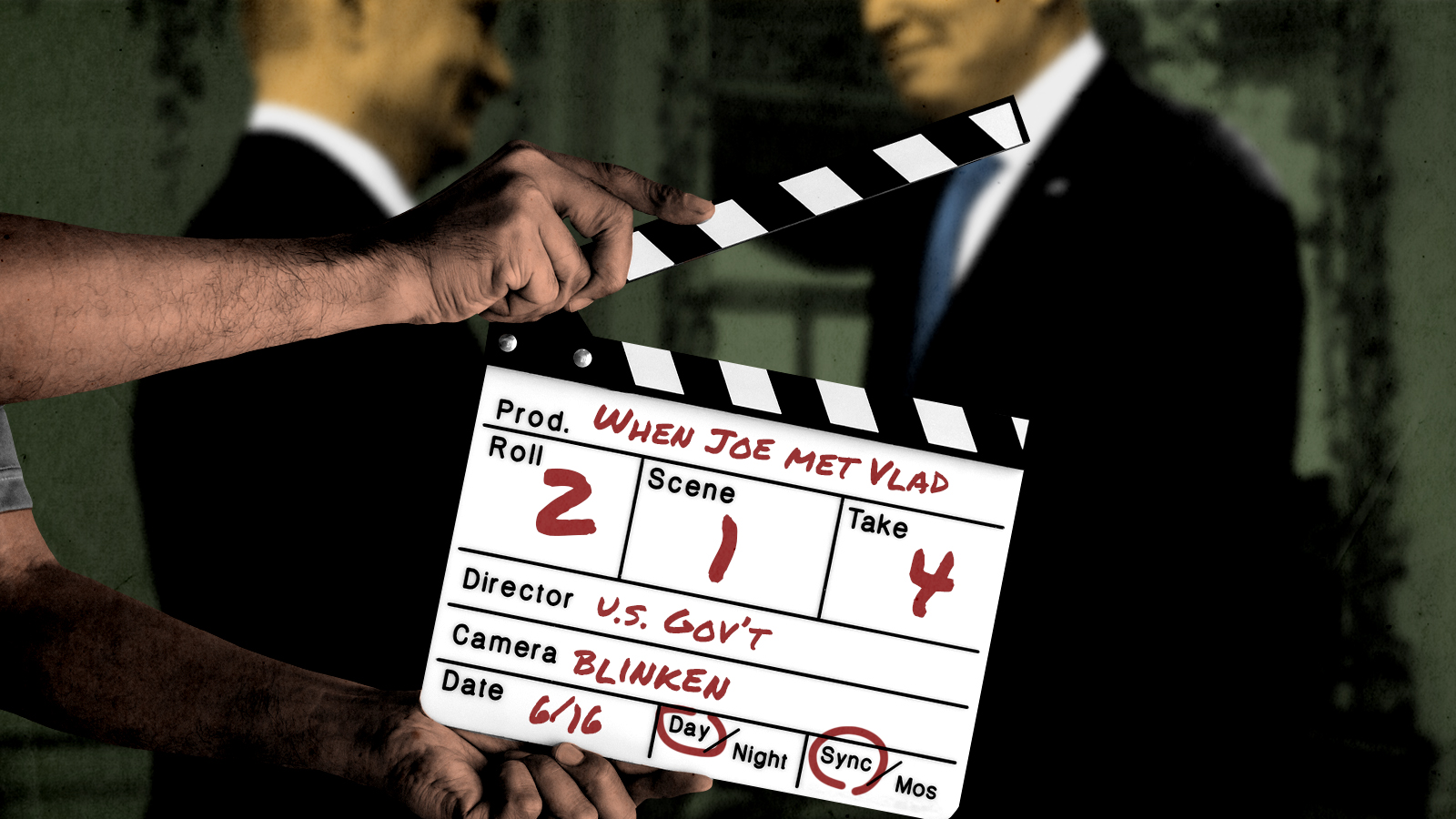Biden's PR stunt with Putin


A free daily email with the biggest news stories of the day – and the best features from TheWeek.com
You are now subscribed
Your newsletter sign-up was successful
Despite all the breathless speculation, not much of consequence appeared to happen at the much-anticipated Geneva summit between President Biden and Russian President Vladimir Putin.
The joint presidential statement released by the two countries after the fact claimed no major breakthroughs and merely restated uncontroversial arms control principles: "Today, we reaffirm the principle that a nuclear war cannot be won and must never be fought."
Meanwhile, the biggest news from Biden's own press conference was his losing his temper at a CNN White House reporter. The subsequent meditations on media negativity did not sound like the words of a man who had a great deal of diplomatic progress to boast about.
The Week
Escape your echo chamber. Get the facts behind the news, plus analysis from multiple perspectives.

Sign up for The Week's Free Newsletters
From our morning news briefing to a weekly Good News Newsletter, get the best of The Week delivered directly to your inbox.
From our morning news briefing to a weekly Good News Newsletter, get the best of The Week delivered directly to your inbox.
For Biden, the summit was at least immediately intended for domestic political consumption. He spoke a great deal about his demands of the Russian leader: that interference in our elections stop, that cyberattacks end, that human rights be protected and dissidents allowed to live, or there would be unspecified "consequences."
While there were no corresponding claims that Putin had agreed to or even given meaningful concessions on any of this, the message was clear: Biden was saying that he, unlike former President Donald Trump, stood up to Putin. Americans of all political stripes generally like it when their president gets tough with foreign despots, provided a minimum of blood and treasure is expended in the process. Democrats in particular remain justifiably angry at Russian meddling in the 2016 election. Many of them think that interference was even worse than the evidence says and that Trump's role in it was greater than former Special Counsel Robert Mueller's team was able to prove.
Thankfully, Moscow — while still illiberal, nuclear-armed, and extremely dangerous — is much weaker than it was during the Cold War. The threats post-Soviet Russia pose are real but do not require a new one.
A free daily email with the biggest news stories of the day – and the best features from TheWeek.com
W. James Antle III is the politics editor of the Washington Examiner, the former editor of The American Conservative, and author of Devouring Freedom: Can Big Government Ever Be Stopped?.
-
 6 exquisite homes with vast acreage
6 exquisite homes with vast acreageFeature Featuring an off-the-grid contemporary home in New Mexico and lakefront farmhouse in Massachusetts
-
 Film reviews: ‘Wuthering Heights,’ ‘Good Luck, Have Fun, Don’t Die,’ and ‘Sirat’
Film reviews: ‘Wuthering Heights,’ ‘Good Luck, Have Fun, Don’t Die,’ and ‘Sirat’Feature An inconvenient love torments a would-be couple, a gonzo time traveler seeks to save humanity from AI, and a father’s desperate search goes deeply sideways
-
 Political cartoons for February 16
Political cartoons for February 16Cartoons Monday’s political cartoons include President's Day, a valentine from the Epstein files, and more
-
 Big-time money squabbles: the conflict over California’s proposed billionaire tax
Big-time money squabbles: the conflict over California’s proposed billionaire taxTalking Points Californians worth more than $1.1 billion would pay a one-time 5% tax
-
 Did Alex Pretti’s killing open a GOP rift on guns?
Did Alex Pretti’s killing open a GOP rift on guns?Talking Points Second Amendment groups push back on the White House narrative
-
 Washington grapples with ICE’s growing footprint — and future
Washington grapples with ICE’s growing footprint — and futureTALKING POINTS The deadly provocations of federal officers in Minnesota have put ICE back in the national spotlight
-
 Trump’s Greenland ambitions push NATO to the edge
Trump’s Greenland ambitions push NATO to the edgeTalking Points The military alliance is facing its worst-ever crisis
-
 Why is Trump threatening defense firms?
Why is Trump threatening defense firms?Talking Points CEO pay and stock buybacks will be restricted
-
 The billionaires’ wealth tax: a catastrophe for California?
The billionaires’ wealth tax: a catastrophe for California?Talking Point Peter Thiel and Larry Page preparing to change state residency
-
 Trump considers giving Ukraine a security guarantee
Trump considers giving Ukraine a security guaranteeTalking Points Zelenskyy says it is a requirement for peace. Will Putin go along?
-
 Bari Weiss’ ‘60 Minutes’ scandal is about more than one report
Bari Weiss’ ‘60 Minutes’ scandal is about more than one reportIN THE SPOTLIGHT By blocking an approved segment on a controversial prison holding US deportees in El Salvador, the editor-in-chief of CBS News has become the main story
